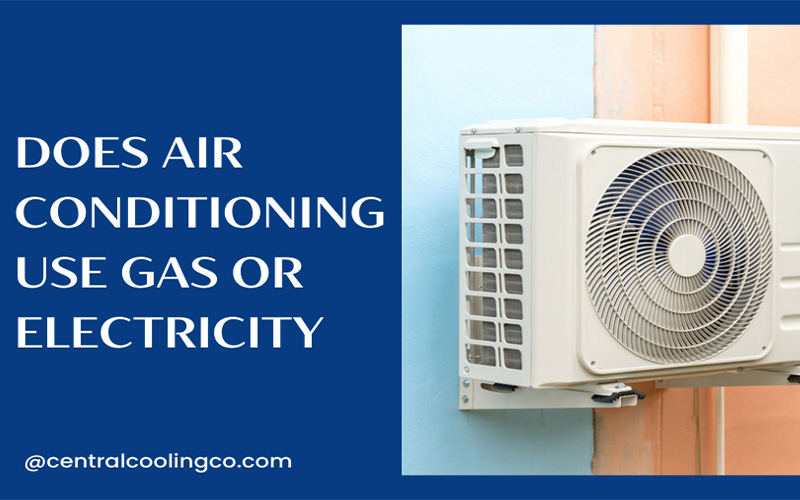Introduction:
As the summer heat becomes unbearable, we often rely on air conditioning to keep us cool and comfortable. But have you ever wondered how air conditioning works and what powers it? In this blog post, we will explore the science behind air conditioning and answer the question: Does air conditioning use gas or electricity?
Air conditioning systems primarily rely on electricity to function. The process of cooling the air involves a complex system that requires the use of electricity to power the various components. Let’s take a closer look at how air conditioning works.
The Basics Of Air Conditioning:
At its core, air conditioning removes heat from the air and circulates cool air into a space. This is achieved through a series of components, including a compressor, a condenser, an expansion valve, and an evaporator.
The compressor, typically located outside the building, plays a crucial role in air conditioning. It compresses a refrigerant gas like Freon and raises its temperature and pressure. The high-pressure gas then flows into the condenser.
The condenser is responsible for dissipating the heat from the compressed gas. It consists of a network of tubes with fins, which allow the heat to transfer to the surrounding air. As the gas cools down, it condenses into a high-pressure liquid.
The high-pressure liquid then passes through the expansion valve, which regulates the flow of the refrigerant into the evaporator. As the liquid enters the evaporator, its pressure drops, causing it to evaporate and absorb heat from the surrounding air.
The evaporator is where the actual cooling of the air takes place. A fan blows warm air from the room over the evaporator coils, filled with the cold refrigerant. As the warm air passes over the cold coils, the heat is transferred to the refrigerant, cooling the air. The now-cooled air is then blown back into the room.
Electricity: The Power Source:
Let’s address the main question: Does air conditioning use gas or electricity? The answer is yes. Air conditioning systems rely on electrical power to operate. Turning on your air conditioner uses electricity to power the compressor, which circulates the refrigerant.
The compressor compresses the refrigerant, raising its temperature and pressure. This high-pressure, high-temperature gas then flows to the condenser, releasing heat into the outside environment. As the refrigerant cools down, it transforms into a liquid state and moves to the evaporator.
Refrigerant: The Cooling Agent:
While air conditioning systems use electricity to power the compressor and other components, the cooling effect is achieved through a refrigerant. Refrigerants are chemicals with low boiling points that can easily change from a gas to a liquid and vice versa.
As the refrigerant evaporates in the evaporator coil, it absorbs heat from the surrounding air, cooling it down. This cooled air is then circulated back into the room, providing a comfortable indoor temperature. The refrigerant then returns to the compressor to start the cycle again. While air conditioning systems use electricity to power the compressor, the cooling effect is achieved through a refrigerant. Learn more about “Does Coolant Affect Air Conditioning?”
The Role of Gas In Air Conditioning:
While air conditioning systems primarily rely on electricity, a small amount of gas is involved. If it is one in older air conditioning units, a small amount of natural gas or propane may power the ignition system or the heating component.
However, it’s important to note that the gas used in air conditioning systems is minimal compared to the electricity required to power the overall operation. Most of the energy consumption in air conditioning comes from the electrical components.
Energy Efficiency And Environmental Impact:
As we become more conscious of energy consumption and environmental impact, it is essential to consider the energy efficiency of air conditioning systems. Energy-efficient air conditioners are designed to consume less electricity while providing effective cooling.
Additionally, technological advancements have led to the development of eco-friendly refrigerants with a lower environmental impact. These refrigerants, such as R-410A, have replaced older refrigerants like R-22, contributing to ozone depletion.
The Importance of Regular Maintenance:
Regular maintenance ensures your air conditioning system operates efficiently and effectively. This includes cleaning or replacing air filters, checking refrigerant levels, and inspecting the overall system for any issues.
Maintaining your air conditioning system can optimize performance, reduce energy consumption, and extend its lifespan. Additionally, regular maintenance helps identify and address potential problems before they escalate into costly repairs.
Conclusion:
Understanding the intricate mechanisms and energy sources behind air conditioning systems is crucial in making informed decisions about our cooling needs, particularly in the face of increasing energy consumption and environmental concerns. While the operation of air conditioning relies predominantly on electricity, with minimal involvement of gas in older units, advancements in technology have led to more energy-efficient models and the adoption of eco-friendly refrigerants, mitigating environmental impact. However, it’s imperative to prioritize regular maintenance to optimize performance, reduce energy consumption, and prolong the lifespan of these systems. By staying informed and adopting efficient cooling practices, we can not only ensure our comfort but also contribute to a more sustainable future.
Frequently Asked Questions
Is Air Conditioning Expensive To Run?
The cost of running an air conditioner depends on various factors, such as the size and efficiency of the unit, the local electricity rates, and the climate. While air conditioning can increase energy bills, using energy-efficient models and implementing smart cooling practices can help reduce costs.
How Often Should I Service My Air Conditioner?
Regular maintenance is essential to keep your air conditioner running efficiently. Having a professional service your unit at least once a year is recommended. This includes cleaning or replacing filters, checking refrigerant levels, and inspecting the overall system for any issues.
Can I install An Air Conditioner Myself?
While some individuals may have the skills to install a window or portable air conditioner, hiring a professional for central air conditioning installations is generally recommended. Professionals have the expertise to ensure proper sizing, installation, and optimal performance.
Disclosure: We may get commissions for purchases made through links in this post.








